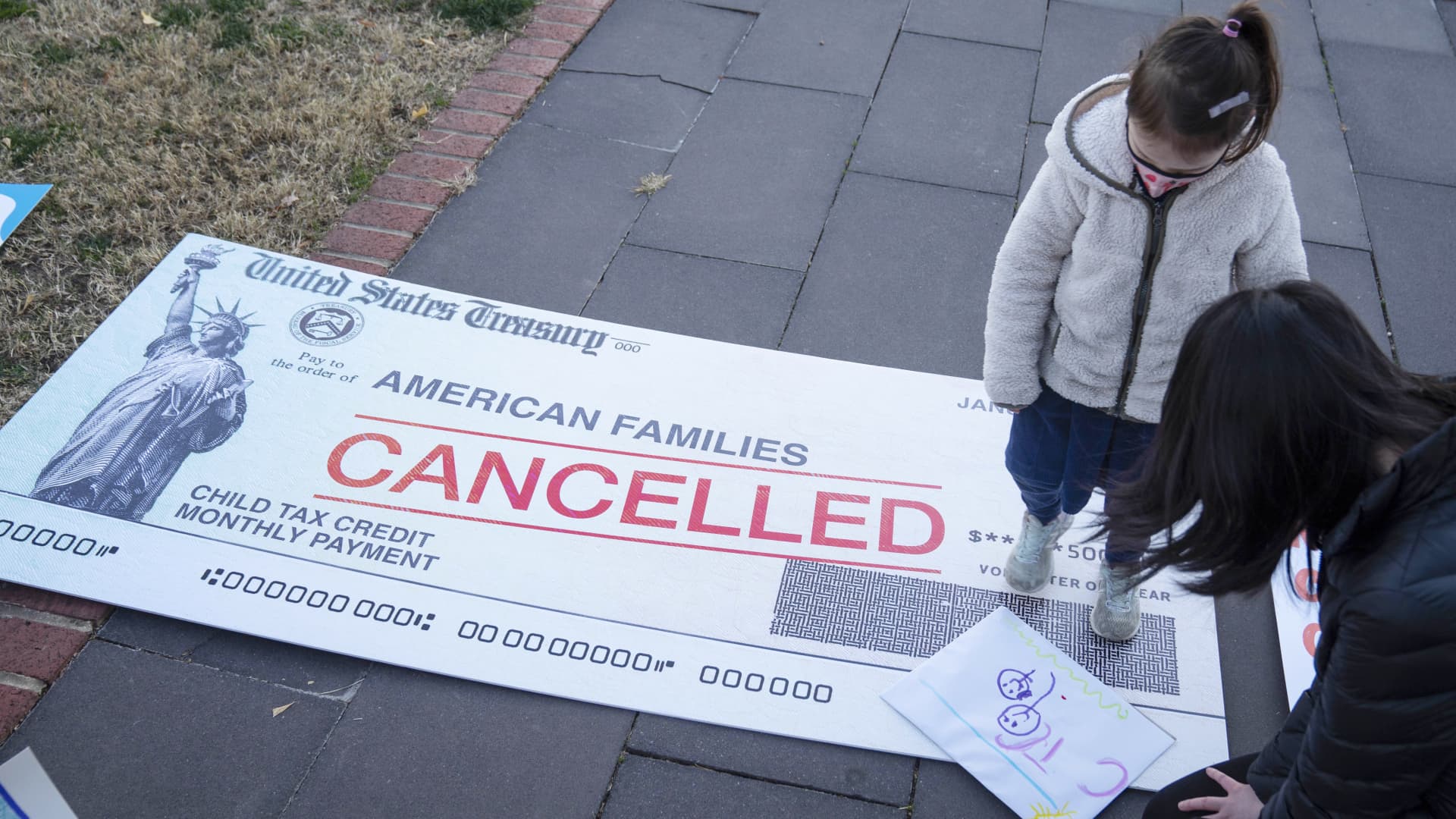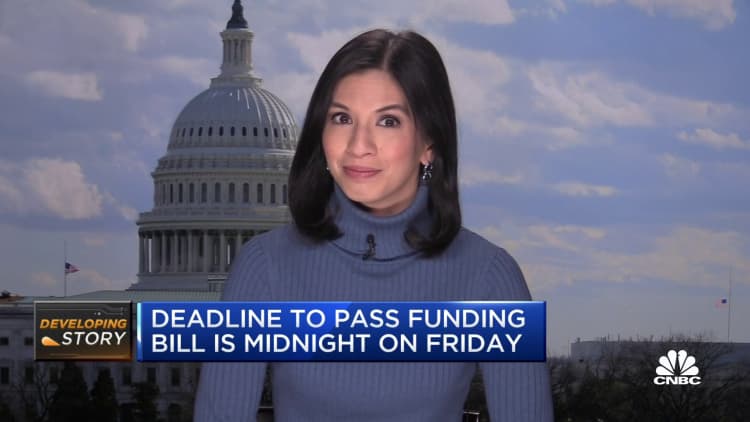
What Congress missed in lame duck session
Mothers and fathers and young children take part in a demonstration structured by the ParentsTogether Basis in help of the baby tax credit score portion of the Make Back again Much better invoice outside the house of the U.S. Capitol on Dec. 13, 2021.
Sarah Silbiger | Bloomberg | Getty Images
Washington lawmakers are dashing to get as significantly done as possible in advance of the calendar yr and the lame-duck session of Congress runs out.
Some changes poised to go by means of could have a massive effects on Americans’ funds, particularly some massive retirement cost savings updates poised to get bundled in a year-end shelling out monthly bill.
But some other proposed initiatives have not produced the slash, and that might also have a huge affect on individuals’ and families’ funds until Congress has the prospect to revisit them once more.
Far more from Individual Finance:
Secure 2. bill on keep track of to usher in retirement program enhancements
New retirement laws leaves a ‘huge difficulty untouched’
New crisis price savings rules may well assistance enhance money safety
“Policy advances that would handle the each day demands of low-income persons and households were largely still left out, regardless of attempts by quite a few policymakers,” Sharon Parrott, president of the Centre on Budget and Plan Priorities, lately wrote of the year-finish omnibus package that would continue to keep the authorities funded via much of 2023.
The “unfinished business” leaves a to-do checklist for lawmakers on both sides of the aisle subsequent calendar year, she explained.
Here’s how the troubles that skipped the slice this yr may possibly crop up yet again in 2023.
Child tax credit improvement
A calendar year in the past past December, tens of millions of people obtained their past month to month boy or girl tax credit checks.
Legislation to assistance dad and mom cope with the outcomes of the Covid-19 pandemic created the boy or girl tax credit rating additional generous for the 2021 calendar yr. For the initially time, that also bundled advance every month payments.
The most kid tax credit sums went up from $2,000 for every child to $3,600 for every child below age 6 and $3,000 per little one ages 6 by way of 17. Up to 50 {ac23b82de22bd478cde2a3afa9e55fd5f696f5668b46466ac4c8be2ee1b69550} of the more generous sums was sent out in every month payments to households — $300 for every little one under 6 and $250 for every boy or girl ages 6 by means of 17.
Importantly, it also manufactured the credit score totally accessible to family members with tiny to no money, which helped minimize boy or girl poverty.
Now, a large push to renew more generous phrases for that tax credit history have fallen flat in calendar year-conclusion negotiations.
A vital reason why is lawmakers had hoped to attach the effort to company tax breaks, which did not finish up being deemed.
“That’s absolutely the greatest, most regrettable exclusion for the year, no problem about it,” Chuck Marr, vice president of federal tax coverage at the Middle on Funds and Coverage Priorities, said of the little one tax credit.

The 2021 child tax credit score expansion was very prosperous in driving down baby poverty to a history lower and serving to family members fulfill report prices, Marr pointed out.
“I imagine there was a compromise there to be experienced, and it didn’t transpire,” Marr explained.
On the vibrant facet, the similar compromise to re-up the boy or girl tax credit history along with corporate tax breaks may well occur up yet again in 2023, he mentioned.
Some lawmakers have insisted the little one tax credit score gets integrated in any new tax legislation. “It truly is pretty straightforward — no company tax cuts without the need of tax cuts for performing family members,” Sen. Sherrod Brown, D-Ohio, recently mentioned.
However other leaders want to see much more rules attached to the child tax credit rating, these as perform demands, which will probably involve compromise, and could necessarily mean any new plan may well be a lot less generous than the 2021 enlargement.
“I believe all those conversations are likely to be starting up early subsequent yr and continuing in the course of the 12 months,” mentioned Shai Akabas, director of financial coverage at the Bipartisan Coverage Centre.
Supplemental Protection Earnings updates
Supplemental Protection Revenue, a federal method that delivers advantages to the elderly, blind and disabled, turned 50 this calendar year.
But many of the program’s guidelines have not been up-to-date for many years.
A bipartisan bill from two senators from Ohio — Brown and Republican Rob Portman — would elevate the asset boundaries for beneficiaries to $10,000 for men and women and $20,000 for partners, although also indexing them for inflation.
That proposal did not make the minimize in 12 months-finish legislation in spite of higher hopes from advocates.
We carry on to see a lack of enough political will to allow folks with disabilities to help you save.
Rebecca Vallas
senior fellow at The Century Basis
These days, the program’s asset restrictions are $3,000 for every couple and $2,000 for individuals. That not only limitations the amount of money of savings beneficiaries may possibly have, but it also imposes a relationship penalty on beneficiaries.
“SSI’s punitive and archaic asset restrict is the most egregious anti-savings evaluate in federal law right now,” claimed Rebecca Vallas, senior fellow at The Century Basis and co-director of the believe tank’s Incapacity Financial Justice Collaborative.
“Yet we continue to see a absence of ample political will to let people with disabilities to help you save,” Vallas claimed.
The fate of the proposal is unclear since Portman is retiring this year and it continues to be to be viewed no matter whether a different Republican leader will move up to guidance it, Akabas explained.
“It truly is going to almost certainly be some time right before that receives a further opportunity,” Akabas stated.
Social Stability system funding
The year-conclude price range offer offers supplemental funding for the Social Safety Administration, but “hardly adequate to tread water,” Kathleen Romig, director of Social Stability and disability plan at the Heart on Price range and Policy Priorities, not long ago wrote.
The deal features a 6{ac23b82de22bd478cde2a3afa9e55fd5f696f5668b46466ac4c8be2ee1b69550} enhance, or $785 million, about the agency’s 2022 funding degree, Romig mentioned. President Joe Biden had asked for an 11{ac23b82de22bd478cde2a3afa9e55fd5f696f5668b46466ac4c8be2ee1b69550} increase, or $1.4 billion additional, she famous. Household and Senate committees experienced also backed a lot more funding for the company.
The supplemental funding could have assisted the Social Stability Administration decrease its backlog and long waits for assistance by updating its know-how devices and seek the services of new team, Romig observed.
“As a substitute, applicants and beneficiaries facial area a different yr of unacceptable waits for the Social Security and other gains they’ve acquired,” Romig wrote.
Congress possible will not revisit funding for the Social Safety Administration until finally upcoming fall, according to Akabas.
Additional expansions for crisis savings
New retirement proposals poised to shift now incorporate a improve for emergency cost savings. Prepare vendors will be ready to instantly enroll staff in separate accounts exactly where they can set aside up to $2,500 for near-expression requirements together with their retirement cash. A different provision would lets plan participants withdraw $1,000 for each year for emergencies without having penalty, nevertheless some restrictions would use.
But a proposal that would just take that even further and enable for individual standalone emergency funds exterior of retirement accounts did not make it into the legislation.
That would assist just about 50 million staff who do not have place of work retirement ideas to established apart emergency money, in accordance to Akabas.
The proposal possible did not make it into the year-conclude legislation possible due to the fact it is nonetheless remaining crafted, he mentioned.
“I am cautiously optimistic that in the next 12 months or two that that could move on some other laws,” Akabas explained.
